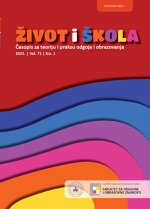RELATIONSHIP BETWEEN PRIOR LEARNING ABOUT INTERCULTURALISM AND DEVELOPMENT OF INTERCULTURAL SENSITIVITY IN SECONDARY TOURISM SCHOOL STUDENTS
DOI:
https://doi.org/10.32903/zs.71.1.4Keywords:
interculturalism, intercultural sensitivity, secondary tourism school students, learn- ing about interculturalismAbstract
Long-term globalization processes have made social interaction with different nations and cultures an everyday occurrence. The development of intercultural competence, or intercultural sensitivity, is a lifelong process that reduces ethnocentrism, discrimination, stereotypes, and inequalities in society, with educational institutions playing the most important role in this process. Future tourism professionals—students of secondary tourism schools—should acquire at least the basic elements of intercultural sensitivity during their education. Based on the above, the aim of this research was to examine the extent to which prior learning about interculturalism and socio-demographic factors contributes to the level of intercultural sensitivity among students attending secondary vocational schools with a tourism orientation in the City of Zagreb and Istria County. A total of 409 students from nine tourism-oriented secondary schools in the City of Zagreb and Istria County participated in the study. The research used a questionnaire that included socio-demographic questions and an adapted Intercultural Sensitivity Scale (Buterin, 2013), which measures students’ intercultural sensitivity through the intensity of appreciation and acceptance of members of other cultures and nations. The results indicate a statistically significant correlation between the scores obtained on factors related to intercultural sensitivity and the scores obtained on the intercultural understanding test. This suggests that respondents who scored higher on factors relevant to interculturalism demonstrated a better understanding of the concept itself. The findings emphasise the importance of enriching secondary school curricula with content that promotes understanding and respect for different cultures and peoples. Thus, the paper offers guidelines for supplementing existing curricula in the education of future tourism professionals and provides recommendations for future research.


